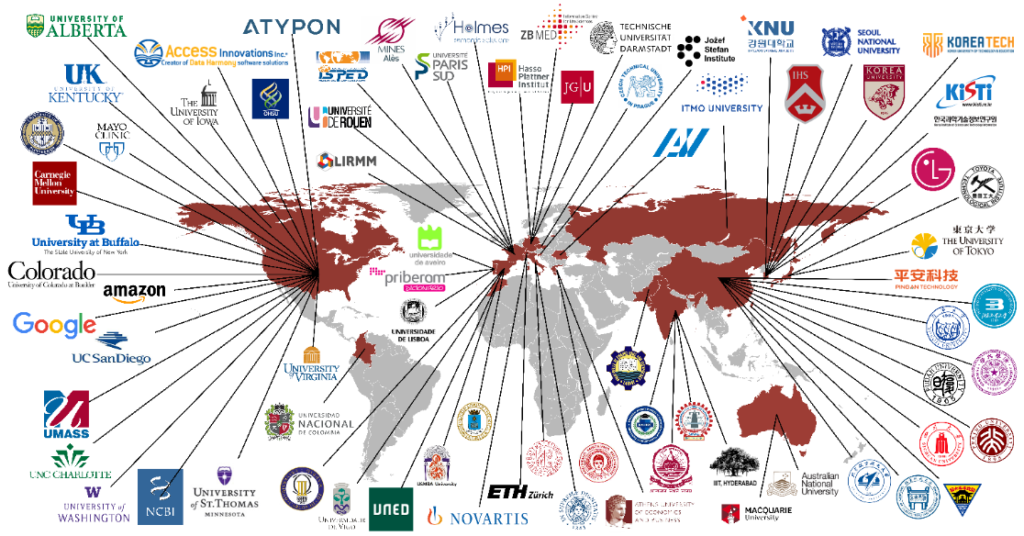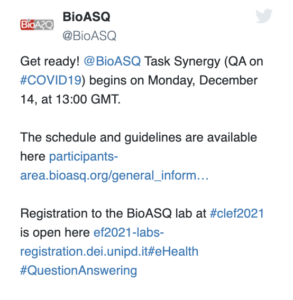A number of Atypon’s search and content enrichment features share a common lineage: the BioASQ Challenge, a formative testing ground for biomedical inquiry and information-processing advancements that’s organized as an international technology competition. Atypon has proudly sponsored and competed in the annual event for the last seven years, alongside notable supporters including Google, Amazon, and the National Institutes of Health.
BioASQ envisions a future where doctors and researchers anywhere in the world—even patients or home caregivers—can find reliable, responsive, potentially life-saving medical answers in any language, instantly. While the competition is highly technical, its goal is for complex information to become intuitively accessible by everyone.

Recent BioASQ participants
Funded initially by the European Commission upon its launch in 2012, this annual event draws researchers and developer teams from leading tech companies and universities into head-to-head match-ups where competing systems are measured against uniform quantitative and qualitative international performance standards. BioASQ’s expanding competitive field continues to generate groundbreaking progress across search, knowledge extraction, and content classification with innovations that Atypon makes applicable across all of the subject areas and languages in which our customers publish.
Raising the discovery bar
Each year, BioASQ publishes a list of challenges, requisite data sets, and the performance evaluation measures by which competing solutions will be judged. Then teams of experts in information retrieval, machine learning, natural language processing, and text mining from across the world create highly precise, state-of-the-art biomedical information retrieval systems in response to each challenge. Since Atypon began competing in 2013, we have earned 21 first-place challenge finishes and 31 second-place finishes.
“Tasks” from the most recent, 8th annual BioASQ Challenge included:
- Producing large-scale, real-time semantic annotation (indexing) of biomedical documents
- Generating real-time appropriate responses to natural language questions
- Retrieving and synthesizing relevant information from textual and structured data
One of Atypon’s winning solutions in last year’s first challenge was our Spanish-language classifier, which is helping expand state-of-the-art classification solutions to non-English content. We recently shared the system, pro bono, with the Spanish National Institute of Bioinformatics, at their request. (Atypon’s English-language classifier won BioASQ Challenges in 2019 and 2020).
Atypon productization
The following information retrieval and content enrichment enhancements are the result of solutions our team developed to compete in BioASQ challenges:
- Auto-tagger. This automatic content/corpus classification engine works with proprietary and public taxonomies of any size (from hundreds of topics to hundreds of thousands topics) and supports the multilingual classification of scientific documents in any language. It has been in use since 2016 for auto-tagging content loaded to Literatum.
- Literatum’s Knowledge Extraction Engine. This solution improves content discoverability by extracting relevant information such as keywords, concepts, and funding information and identifying relationships between these entities.
- Literatum’s Recommendation Engine. In use on Literatum sites since 2012,our recommendation engine is being improved via our BioASQ winning auto-classification technology. Later this year, Literatum customers will be able to present visual topic tags next to recommended article titles to offer readers more context for each recommendation
- Natural Language Question Answering (QA). A BioASQ winner that will be a future major enhancement to Literatum’s onsite search functionality, QA can dramatically accelerate readers’ ability to root out information embedded within articles.
Extending the gains
While solutions can take shape around a BioASQ challenge, their development rarely ends there. For example, Literatum’s Auto-tagger has been enhanced considerably since its BioASQ award-winning debut in 2018, including algorithm enhancements that have improved its accuracy by 12% and expanded the number of topics it can process by tenfold—all in the service of continually perfecting content discovery and utilization.
Beyond any single innovation, however, Hong Zhou, Atypon’s BioASQ team lead and our Director of Product Management for Artificial Intelligence, sees a broader dividend. “Going up against the best teams in the world is exhilarating, but even more important is BioASQ’s role in constantly seeding solutions that elevate the state of our industry across scholarly inquiry, discovery, and information-processing. By attracting diverse teams to solve the same problems and share their ideas, the event helps us all develop better solutions. It’s gratifying to be part of a process and a community that benefits everyone.”
Had the pandemic not precluded the conference and workshop portion of 2019/2020’s BioASQ Challenge, teams would have gathered in Thessaloniki, Greece, this past September. In what feels like a fitting reflection of the event’s community service spirit, the forthcoming 9th annual BioASQ Challenge will set its sights on COVID-19-related discovery tasks.
Learn more about the BioASQ Challenge and how to support its efforts here.







